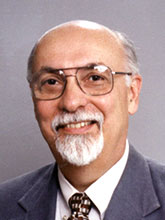With Dr. Bruce Hartung
The “Pressure Points” columns for January and March were about various aspects of Internet use, with special emphasis on Internet pornography.

As promised, this month’s column — fueled by communications from several readers — takes up the general topic of computer use. That topic is usually paired with concern for a church worker spending a lot of time in the office and not so much time out and about. Following are two readers’ questions (in italics) and my response regarding such concern.
Q: Our pastor spends a lot … of time in the office at his computer. He says he is studying. Maybe he is. But spending hours there and not making calls and being with his people seems out of whack somehow. Are there any guidelines about how many hours he should spend “online”? Is there such a thing as Internet addiction?
Q: When the computers in our church were serviced, we discovered that our pastor was playing Internet games on the church’s computer. We already knew that he was on his computer a lot and was doing a lot of blogging. We have discussed all this with him. He says it is a way to relax, at least the games part. He is a nice guy, although somewhat shy. We want him to do well here, but he gets very defensive about this. He just needs to spend more time with the members here and less time with his computer. Do you have any suggestions?
A: When the proverbial push comes to shove, the basic question seems to be about where the balance lies between office work and being with members and out in the community. One factor that feeds the imbalance is computer-use time. Clearly, the computer and Internet bring great opportunity for good. But as with almost anything in a fallen world, they also can bring considerable danger.
There is significant dispute about the question of “addiction” to the Internet. So, I will pass on that until more evidence is presented. However, there are helpful resources provided by those such as Dr. Kimberly Young at the Center for Internet Addiction (netaddiction.com) that do address the topic of Internet addiction. Her work is certainly worth reading, and the Online Addiction Quiz available there is worth taking. (I did!) You might encourage your pastor to honestly take the quiz and share the results. Perhaps the conversation could then move more constructively. Young’s co-authored work titled Breaking Free of the Web and Kevin Robert’s Cyber Junkie also are useful (but not perfect) helps.
Whether it’s an addiction or not, the basic issue for all of us concerning our use of the Internet is, I believe, two-fold: 1) Does use of the Internet interfere with job/vocational performance and/or with interpersonal relationships? and 2) Is the Internet being used to medicate, as it were, or to compensate for some other problem, concern or feeling that is not being directly addressed? If the answer to either of these questions is “yes,” then there should indeed be significant concern. Both readers are suggesting a “yes” answer to the first question.
Like most church-worker/parish-leadership concerns, the first step is continuing an ongoing conversation. You have a concern. Talk to your pastor, perhaps along with others who have similar concerns. Make sure he knows your concerns and especially your desire for him to do well in your midst. The idea is not to attack him (and hopefully you have not let this concern build so that there is a lot of pent-up irritation), but rather to offer helpful feedback and to encourage the interpersonal interaction that you believe are needed in your congregation. With this discussed in a safe environment, I hope that your pastor will be open to your feedback, will identify if he can see your concerns and will recognize his own vulnerability. May your conversation together be a prayerful one guided by God’s Holy Spirit.
If there is not a meeting of the minds and hearts within the congregation about this, perhaps a congregational consultant might be useful. Your district may know of one to recommend.
I applaud that you are surfacing your concerns. All too often, responses and concerns are pushed underground and fester in the darkness. Satan works more effectively in the darkness. In the light of day — in the light of the sun and in the light of the Son — concerns that people have for each other can be healed.
The Rev. Bruce M. Hartung, Ph.D., is professor of Practical Theology at Concordia Seminary, St. Louis. He can be reached at hartungb@csl.edu.
Posted April 25, 2014





For those critical of their pastor’s visitation habits, I wonder when was the last time you invited your pastor to visit you? For those who expect their pastor’s to stick their noses into everyone’s business for pastoral care, when was the last time you invited your pastor into your personal business?
The point of inviting my Pastor to visit is well taken. He should be made to feel welcomed in my home as friend and Pastor.
When addressing visitation to shut-ins and institutionalized, every reasonable attempt should be made by Pastor and lay people to do so. The eligible shut-ins, etc., value a visit and receiving communion on a regular basis.
As any human being, some Pastors are better than others at this. Never-the-less, it needs to be done by every church.